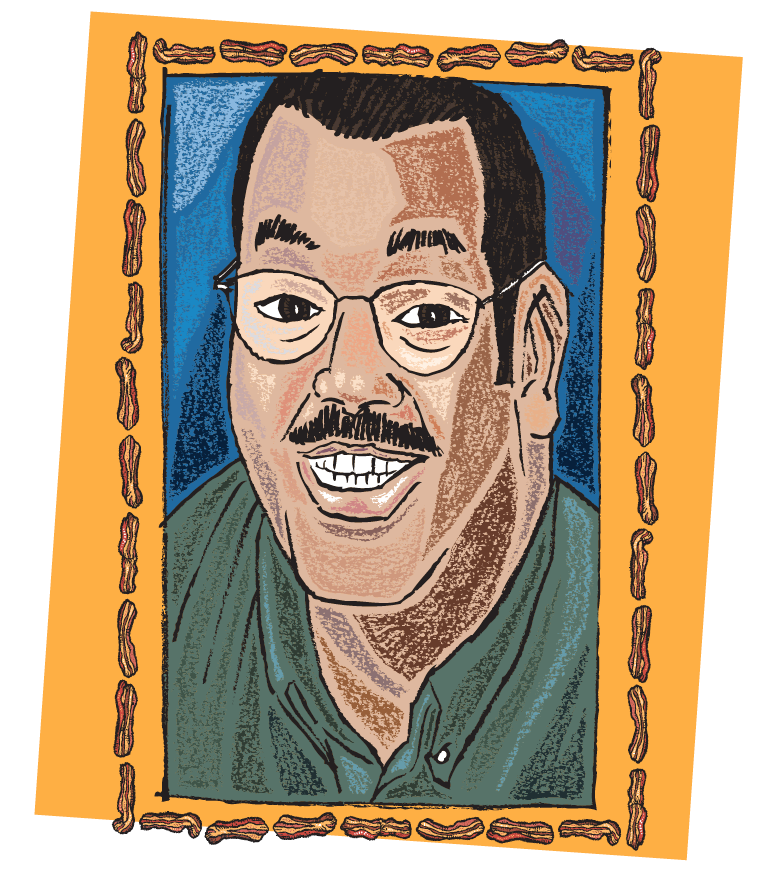An Interview with Fidel Galano
For me, one of the beauties of Ann Arbor is the plethora of powerfully interesting, creative, cool people we have here in town. Many I get to work with, others we buy from, and still others we get to cook for. Fidel Galano is one of the latter. I first met him fifteen years or so ago. We did a day of ZingTrain work, teaching our approach to Servant Leadership at the local EPA office. His official role here in Ann Arbor is as IT Director of the EPA’s National Vehicle & Fuels Emissions Laboratory. We connected during the teaching, and it turned out, he was also a customer. Over the years I’ve happily seen him at the Roadhouse, the Deli, and the Bakehouse, and he’s always told me how great his family’s Cuban cooking is. Fidel grew up in Spanish Harlem. He’s an amazing guy; a highly inspiring success story.
Never one to pass up an opportunity for good learning and good eating, I’ve been suggesting for about a decade now that we bring Fidel in for a special Cuban American dinner at the Roadhouse. Finally, ten years later, it’s happening. In July, the Roadhouse’s annual BBQ dinner will feature Fidel’s family cooking. And, of equal import, it will feature Fidel, the man himself. He’ll share stories of growing up in Spanish Harlem, his mother’s, grandmother’s, and family’s (mostly aunts) recipes, the emotional connection with that cooking in the Cuban & Puerto Rican community, and the significance of pork in his family. I guarantee you will eat well, and leave wishing that you, too, had been born Cuban. The man is about as apasionado (passionate) as anyone I’ve ever met!
Fidel has also offered to speak and serve some amazing Cuban pork at Camp Bacon®. Which means that you have two chances to taste and savor his incredible cooking, and two opportunities to meet the man himself and hear part of his culinary and culturally inspiring story. I have a feeling that Camp Bacon® would be worth coming to just to hear him tell his story, and preach the positive attributes of Cuban pork cooking. Let me just say that of all the great people I’ve interviewed over the last three plus decades, Fidel might just be the most passionate about great pork of all of them! Here’s a little taste of what I’m talking about.
– ARI
Fidel Galano: ANN ARBOR’S KING OF CUBAN PORK

ARI: You grew up in Spanish Harlem?
FIDEL GALANO: My dad was born in Cuba and my Mom in Puerto Rico. I was born and raised in New York City’s Spanish Harlem community. I didn’t learn to speak English ’til I was in 2nd grade, ’til I was maybe 5 or 6 years old, mostly because I did not have to. Everyone in my neighborhood spoke Spanish, including the mailman. I was always trouble, mostly because I was bored—I was unusually smart and articulate for a Spanish kid growing up in the middle of the ghetto. I was smart enough to hang out with the tough kids, and I knew if I could keep ‘em laughing I would be alright. They called me “Fi” (“Fee”). I’m very lucky. I have a great life. I met my wife Nancy when she was 15. Our local priest got my mom to send me to a Catholic retreat when I was 14 or 15. It was a place called Grace House at 108th Street, not too far from home. A real nice brownstone converted into a Catholic monastery and they lock you in for the whole weekend, which seemed like weeks to a teenager. So this priest, Father Bill, he’s responsible for why I got out of the neighborhood. He went all out in trying to keep me from getting in trouble and I have to say he really helped me. Even though he gave up on me for a while and he didn’t believe me when he said I was gonna go back to school. Who would, when you consider I was in and out of school from the second grade on up and I completely dropped out in the 6th grade? Father Bill was blown away by my resilience when, at age 19, I told him I needed to go back to school so I could get my family out of the neighborhood. Years later, after getting a GED and earning a Bachelor’s degree, I invited Father Bill to my business school graduation. Right before taking a group photo at graduation he said, “Fi, you make me believe in God.”
I knew early on that I needed to get out of the neighborhood. A lot of my friends never made it out. I was 19, and Father Bill helped me get my GED. I really couldn’t read, but I took the GED book from his office and I studied and studied and I passed. My friend scored just a few points lower than I did and he didn’t pass. And our lives went in opposite directions. Right after getting a GED I went to college at SUNY Binghamton. I really struggled that first summer as I was taking prep courses. I was failing and thinking about giving up and going back to the City. But then I realized I knew what to do, because I figured college was like working. I’d been working since I was twelve and I knew that work meant get there early, work really hard, don’t watch the clock, and make the boss happy. So going to class and studying was like going to work, and listening to the professor was just like listening to the boss, including making the boss happy. So I applied myself as if I was working a job and I never looked back. In my first semester I got a perfect grade point average. I was featured in a school newsletter and I won an award. I went on to do very well, graduating with honors from SUNY Binghamton’s Thomas J. Watson School of Engineering and given an offer to go to graduate school on a fellowship.
ARI: What about the food?
FIDEL: I can’t remember a time in my life that food wasn’t significant for us. Pork always represented prosperity. When there wasn’t food, specifically pork, it was always because things were bad. We had many hard times. Like when my parents got divorced. All I knew when I was a kid was we got eviction notices and I never knew if we were OK. But one thing I knew is that if we had pork, such as Pernil (slow-roasted marinated pork shoulder) or Chuletas (pork chops) with our staple rice and beans, then I knew that, for the moment at least, we were OK.
In our culture my dad didn’t hug you to reassure you or say anything about what was happening financially and my mother wasn’t gonna tell a seven-year-old kid about her stresses. But the indicators were always there, so if we were gonna have pork, life was gonna be ok. To us, pork was an index to prosperity and social enjoyment.
There are many traditional and religious holidays in both the Cuban and Puerto Rican communities where pork is the main dish used to celebrate. All the Saint’s days, Santa Barbara, San Lazaro, and Easter and Christmas. Lent was one of the only times I remember not having pork during a celebration, and that’s because we could not for religious reasons. So instead we have fish fries with the other fillers we normally had with pork, yucca chips, fried plantains and fried bananas (maduros).
When things were good in general, there was this fantastic, amazing piece of meat: pork. It was made in many different ways. From a Lechón (roasted suckling pig), to a Pernil. The idea that we could make a pork shoulder was soothing and comforting, because it meant things were good. When we were kids and we knew there was a pig cooking, we knew that there’d be all these derivative products coming. In addition to the main dish, the Lechón, we knew that Morcilla (blood sausage made with rice, culantro, cilantro, garlic, and chillies), Pasteles (plantain or yucca root patty filled with roasted pork chunks) and Pastelillos (flour-based flavor-infused turnover filled with roasted pork chunks, capers, and any other goodies you wanted to add), would follow. We knew having a pig was prosperous because so many dishes would be made from one, and everyone in the neighborhood was the same way. We had one African-American family and one American Italian family in the neighborhood, and even they wanted Cuban and Puerto Rican pork dishes.
ARI: Is all that carrying on to your kids here in Ann Arbor?
FIDEL: There’s a real nexus to what exists today. My mother, my grandmother, and many of my Aunts were known for their food, considered amazing cooks that were often hired by others. Their love for cooking was part of them (the soul) and so was maintaining their reputations. When we prepared and cooked food, especially for the holidays, it was to show love to your family and friends. That means you go the extra mile, you give it that extra something that only the heart and soul can give. I inherited their passion and abilities for cooking and have carried on with my family here in Ann Arbor, even though we are many miles and many dollars away from what I had growing up. My kids get just as excited as I used to about Cuban and Puerto Rican cooking. Although we are now economically removed from that poverty that I grew up with, my kids have been exposed to many of the cooking traditions and approaches I grew up on. Especially cooking pork and some of the amazing Cuban and Puerto Rican foods I was exposed to as a boy. So if you talk to my three children, who all grew up in Ann Arbor, are doing great with top educations, and pursuing advanced degrees, they will say many of the things I said as a boy when it comes to Cuban and Puerto Rican food. For example, when I say that I’m making a cultural pork dish, like Pernil, they all get really excited because they know what it means. Not only do they know the main dish will be filled with great flavor and accompanied by other cultural foods (Cuban black beans, saffron rice and fried yucca root), they also know the derivative dishes to follow, such as Pasteles or Patelillos. They love our cultural food, and that is what they crave. They never beg me to take them anywhere or anything like that, even though my wife and I have exposed them to some of the best culinary cuisine. They want me to make food at home! Now that I’ve slowed down a little with cooking, my daughter says, “Come on dad, I’ll do all the work! Let’s cook!” It’s wonderful to see how they’ve tied an emotional prosperity to our cultural pork dishes, just like I tied them to financial prosperity as boy growing up in poverty.
ARI: What are some of the dishes?
FIDEL: To me, roasted pork is the key. You acquire the pork, wash it in white vinegar and prepare it as you need to (family traditions and/or religious traditions). We always cleaned it really carefully. Then we’d strategically poke holes in the meat to get it to breathe the flavors in. Crush garlic, cumin, black pepper, Spanish paprika, and other dry ingredients to create a dry rub. Then we add extra virgin olive oil and wine or vinegar to make a pesto. Cut nice-sized holes, and insert crushed or whole garlic cloves into them along with a heaping of the pesto. When we made a whole pig or a shoulder, there were all these supporting things around it. You had to have slow-cooked black beans, red rice, double-fried plantains and yucca (boiled or fried). Everything has to be supported by the pork, because it is added in some way. We used pork to flavor almost everything, even the beans and the rice. You start with some pork belly where you almost burn it dark brown and then you deglaze it and then it becomes the base flavor of your beans and yellow rice. If you did not have a whole hog, then you make a pork shoulder (Pernil). Pernil is the poor man’s lechón. It’s the shoulder. If you buy it right, you still get the skin and the fat that help make the flavor we want.
I love the Pastelillos. Those are our turnovers. We make them with this dough that’s infused with saffron. You add the saffron to some oil, and then add that to the dough and then you make these discs and you fold them and seal them with the pork filling inside. Oh man! That’s prosperity! There’s no way to make the turnovers without doing the whole pork roast through. You have to truly get a roasted pork shoulder that you loved and you gave it that passion. You chop up the roasted pork and good distribution of dark and white meat. Red pepper, garlic, Spanish olives, whole capers. It’s the recipe I’ve perfected over the last few years. Season with cumin, salt, garlic. One of our secrets: we put sugar on everything. A little sprinkle to give that little extra…
I love Yucca! Especially Pasteles made of Yucca. Of all the starch family, yucca is it for me! During the holidays, my uncle, my mom, and my grandmother would make many things from Yucca, even though money was always tight. Their cooking was so good that people would front them the cash to get a dozen of these Pasteles. So my grandmother and my mother would turn the whole living room into a production environment. My job as a boy was to grate plantains. My older brother was stronger so he grated the yucca. They would make this base using a plantain or Yucca puree with some other ingredients. They take Achote (annatto seeds) with extra virgin olive oil and slowly cook it to release it, slowly strain it to make that reddish oil, and then mix that into the batter of the Yucca, and also to coat the inside of the rice paper or plantain tree leaf. Then you would take a big banana leaf or rice paper, and a couple ladles of the puree and you would make a round section of it. Then you would take that roasted pork and then you would fold it into this square. You would make a square in the leaf or on rice paper and you would boil it in the leaf. You would get this cooked plantain or yucca. Very soft to cut, but in the middle you had this roasted delicious pork. My grandmother would always add fat, because the flavor was in the fat. She would also add raisins, chickpeas and other things depending on how you liked them. That was a holiday thing! Oh man!
When you’re cooking this stuff in your home, you’re feeling like life is good. We knew life was good. We were gonna eat. We were gonna celebrate food. Pork really matters to us. When I think about my youth and what it meant to me, it was always pork as the holiday meat. I know a lot of people today think of Christmas and they think about beef. But I can’t imagine a rib roast at the holidays. It’s gotta be the pork. Without the pork it doesn’t feel like we’re alive. The beef rib roast means nothing to me. What really matters to me and my family is to have that Pernil or that lechón.
You can make Patelillos, Morcilla, and pig ears. My dad used to love pig ears with hot sauce. And Chicharrón (fried pork rinds). That’s where you take pork belly and then make a rind part of it. They’d cut these slices into it to make more surface area. Almost every dish, rice and beans, always had a little pork in it (mostly fat). It is pretty amazing how one product, the pig, leads to so many other products that would not be the same without pork. Pork is amazing. Man! It’s delicious! My grandmother ate pork skin with the fat every time she cooked a pig. She didn’t care. She ate, drank and smoked to the last day of her life. I don’t think she regretted any day of her life when it ended at age 80.
For dessert we used to make Coquito. It’s a coconut egg nog made with Bacardi 151. There was always Bacardi! We used to grate coconut. It was either to make coconut flan or Coquito. All of these things gave you a sense of we’re gonna be ok!!
Today, we’re very lucky. My kids are all doing well. They still have this great emotional connection to the pork and the other cultural foods we make. Pork means life is good! It means we’re doing well! It means it’s gonna be a great holiday! They have the same love of the culture and of the food. I thought this connection would only be for us, for our family that has been exposed to it. But now my daughters’ fiancé, a fantastic American boy who grew up in Canton, is into it. He asks me to cook, too. And my son’s best friend is Jewish and he wants it!
I know that Nancy, my wife, and I have done well. Better than any fictional story could predict. But I would not feel complete without that part of my culture—the food. The food with its flavors and smells link me to the memories that define me culturally. Without the food there is no celebration there is no feeling of prosperity, and there is no sense of culture. The memories of the food link me to who we are. If you abandon that, the food and the memories, there’s a real sadness for us. We love our culture for many reasons, but most of all because it defines us and links us to those that made us and raised us. Our true north is us, as Cubans and Puerto Ricans! Cuban and Puerto Rican culture, and Cuban and Puerto Rican cooking. And pork! For me, I can’t imagine success without the food of my childhood. We yearn it. Very importantly for the Cuban in me, “when you make a Lechón, we all know a Cuban sandwich is coming next!!”




Zingerman’s Art for Sale